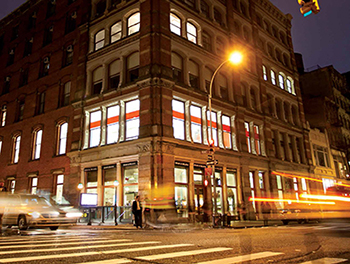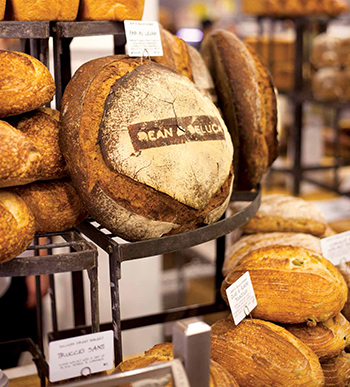Giorgio Deluca, Joel Dean & Jack Ceglic
This trio became specialty food pioneers in the 1970s and 1980s when they gave birth to Dean & DeLuca, a stylish global brand that inspired thousands of retailers to emulate their model.
Foray into Food. In the 1960s, three neighbors on West 12th Street in Manhattan enjoyed cooking together, often testing Julia Child recipes. Joel Dean worked in book publishing, Giorgio DeLuca was a schoolteacher, and Jack Ceglic was an artist. “We just liked food,” Ceglic says. They all moved farther downtown to SoHo, where DeLuca opened a cheese shop in 1973 and Dean and Ceglic planned to start a kitchenware store. Instead, the trio combined their talents, and Dean & DeLuca was born in 1977.
“I was known as the ampersand,” Ceglic quips. “Somebody could complain to Mr. Dean or Mr. DeLuca, but nobody would bother me.”
Ceglic contributed the design for their first store, a small former factory on Prince Street. It was minimalistic, the food showcased in still-life arrangements. The founders took a year to recondition the space themselves. “One day Joel said, ‘It’s time to open. We’ve run out of money,’” Ceglic recalls, adding that his mother was their cashier.
The store was an instant hit. “Art, design, and food became one,” Ceglic says. “Craig Claiborne called us a legend in our own time.”
Breaking Boundaries. In the early days, Dean & DeLuca customers were drawn from SoHo’s artist community, including minimalist Donald Judd and sculptor Louise Nevelson. “They understood and appreciated what we were doing,” Ceglic says. “Artists will pay for quality, buying two slices of charcuterie rather than a pound of supermarket deli meat at the same price.”
James Beard’s assistant Felipe Rojas-Lombardi came on board, “a chef extraordinaire, very instrumental for us,” Ceglic notes. At the time, prepared foods were not a major force in specialty food stores. Rojas-Lombardi’s pates, pasta salads, and tandoori-roasted chicken popularized gourmet takeout.
The business partners traveled widely, scouting interesting products and working with local farmers to develop lettuce varieties, including radicchio, which was rare at the time. Their importing company introduced to the marketplace sun-dried tomatoes and balsamic vinegar. They inched into the mail-order business because Donald Judd wanted his favorite items shipped to his home in Marfa, Texas.
To add a fresh fish and meat department they needed more space. The store moved, in 1988, to a vast corner lot on Broadway and Prince Street, where Dean & DeLuca continues to anchor the neighborhood’s specialty food scene. “We started as a simple grocery store,” Ceglic says. “I don’t think we had any idea we were creating something different. We were not corporate-minded people. We learned. It was what we loved and how we lived.”
DeLuca is still involved in the company, while Ceglic sold his shares five years ago to return to his roots as an artist. Dean died in 2004.
Industry Impact. “To Joel, Giorgio, and myself, we sold good, healthy food—not a lot, but good,” Ceglic muses. “It was about discovery. We were full of ideas, full of ourselves probably, but it is the only food store in the United States that has an international reputation.”
The signage, fonts, and shopping bags remain the same timeless designs Ceglic came up with more than 35 years ago. “I wasn’t making a fashion statement for the day, but something that would last.” And replicate. Dean & DeLuca stores have fanned out across the country and the world.


